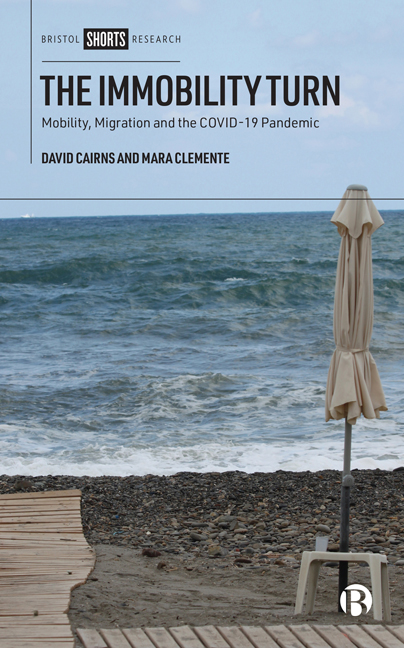Book contents
- Frontmatter
- Contents
- List of Figures
- About the Authors
- one COVID-19 and the Immobility Turn
- two Theorizing the Immobility Turn
- three From Overtourism to Undertourism, and Back Again
- four International Student Mobility and Immobility
- five Maintaining Migration during a Pandemic
- six Mobility after an Immobility Turn
- Notes
- References
- Index
three - From Overtourism to Undertourism, and Back Again
Published online by Cambridge University Press: 18 January 2024
- Frontmatter
- Contents
- List of Figures
- About the Authors
- one COVID-19 and the Immobility Turn
- two Theorizing the Immobility Turn
- three From Overtourism to Undertourism, and Back Again
- four International Student Mobility and Immobility
- five Maintaining Migration during a Pandemic
- six Mobility after an Immobility Turn
- Notes
- References
- Index
Summary
In this chapter, we explore the impact of the COVID-19 pandemic on the tourism industry in Portugal, using findings from fieldwork conducted during 2021 and 2022. The aim is to learn more about the challenges industry stakeholders have faced during an unprecedented and unpredictable public health emergency. In Chapter 1, we noted the extent of the financial losses incurred during the first two years of the pandemic, and in Chapter 2, some of the moral quandaries that arose out of attempts to keep travelling during times of restricted circulation. We now wish to take a more in-depth look at these issues.
In order to do this, we have adopted a number of preexisting theoretical concepts. The first is a relatively familiar theme: the idea of overtourism. This is a topic that attracted a large amount of academic scrutiny during the decade of expansionism that preceded the pandemic (see, for example, Capocchi et al, 2019; Milano et al, 2019; Volo, 2020), becoming a cause celebre in many of the cities that were most visited by international tourists. This includes Lisbon and Porto in Portugal – and elsewhere, Amsterdam, Barcelona and Venice – where in the years prior to the pandemic, tourist numbers increased massively (Malet Calvo and Ramos, 2018). As well as revisiting the concept of overtourism, we try to make sense of the sudden collapse in tourist numbers during the public health crisis. While in Chapter 1, we discussed this transformation using statistics on lower visitor numbers and lost revenue, we now wish to appreciate changes in the meaning of international tourism using the idea of ‘undertourism’. While this is another pre-existing concept, having been used in the past by tourism researchers to help identify new sites for exploitation (Gaitree Gowreesunkar and Vo Thanh, 2020), we interpret undertourism somewhat differently, as a term that describes issues arising from the sudden decline in visitor numbers within a previously popular destination.
Tourism in Portugal
Before we address these theoretical issues, we want to provide a brief commentary on the significance of tourism in Portuguese society. While most countries attract visitors who make a contribution to the national economy, in Portugal the tourism industry occupies a prominent place in public and political discourse, with the country's status as a popular destination for people from across the world seen as a source of civic pride.
- Type
- Chapter
- Information
- The Immobility TurnMobility, Migration and the COVID-19 Pandemic, pp. 34 - 51Publisher: Bristol University PressPrint publication year: 2023

